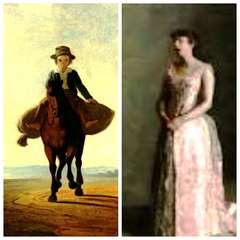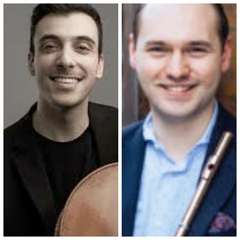|
Back
Radio Heads New York
Peter Jay Sharp Theater, Juilliard School
01/30/2019 -
John Harbison: Six American Painters
Sofia Gubaidulina: String Trio
Katia Tchemberdi: Ma-Or
Esa Pekka-Salonen: knock, breathe, shine
Győrgy Ligeti: Etudes #16, 17 & 18
New Juilliard Ensemble soloists: Giorgio Consolati (Flute), Hanlin Chen (Clarinet), Jasmine Meng Jia Lin, Kenneth Naito (Violins), Joseph Peterson, Zitian Lyu (Violas), Aaron Wolff, Samuel DeCaprio (Cello), Alexander Yau, Piejie Angela Yu, Xin Hau Richarlita You (Pianos), Joel Sachs (Director/Curator)

Bingham’s Mill Boy/Eakins’ Concert Singer
“Radio is called a medium, because it’s rare when anything is well done.”
Fred Allen
“Suddenly,” said Joel Sachs, whose imagination is equal to his expertise, “I had a topic...saluting those broadcasters for giving the world so much new music and helping composers to earn a living.”
During 1950’s days of savant/comic Fred Allen and these days of yelling and screaming, one doesn’t think of radio as a provider of great music, but Mr. Sachs and his European colleagues discovered a world of commissioned music over three-quarters of a century. And in the 2019 annual Juilliard “Focus” series, they have offered six programs of the most varied radio commissions, ranging from the BBC, Radio Ireland and Radio France to Cincinnati Public Radio.
A whole lot to savor, and this penultimate program gave us five composers in a joy of chamber music.
Four were well known–but outside of three Etudes by Győrgy Ligeti, not one of the works was familiar to this writer, so each was a revelation.
Added to this, only two of John Harbison’s Six American Painters were familiar to me. Then again, the composer did not call this “six American paintings,” so possibly he was giving a musical portrait to the small movements rather than a landscape.
Certainly the four players–Giorgio Consolati, Jasmine Meng Jia Lin, Joseph Peterson and Aaron Wolff–on flute and string trio–were melodic enough in the sextet. And it was easy to identify the surges and tides of Winslow Homer. That very dramatic Thomas Eakins was given equal scope with a fiercely dramatic flute solo by Mr. Consolati and some brave valiant string passages for the very dramatic Thomas Eakins.
Yes this was no synaesthesia, Mr. Harbison is an adept melodist and had no intention of reproducing a Debussy Mer or a Martinů Fresco. So one ignorant of the other painters was left to enjoy the bagatelles, the few cadenzas (Mr. Consolati on painter “Hoffman”) and the delights of a lyric master.
Following this was Sofia Gubaidulina’s String Trio, dedicated to Boris Pasternak. Ms. Gubaidulina, part (take a deep breath) Tatar, Crimean, Jewish, Russian and Jewish, whose religion includes (take another breath) mystical Christianity, Jewish and Bach, is ever surprising. Her piece here, with complex program notes, is surprisingly simple.
Movement one is colorful, quartet-note set of variations on a single note. (I was thinking of titling in Bewitched Bothered and B Major) The finale takes in music from the first two movements, and is more angular, more forward.
But it is the second movement with a visionary picture. To be exact, violin and cello become involved in garrulous conversation spoken in pizzicatos. At times interrupting each other, at times in concord. The subject, though is insignificant.
Not, though, violist Zitian Lyu’s cello, whose notes are quiet, almost unheard, in the highest harmonics. Pure and meditative and (perhaps in Ms. Gubaidulina’s cosmos) the voice of a celestial being.
A wondrous movement indeed.
Katia Tchemberdi, the young Russian composer, wrote a work for solo clarinet called Ma-Or, the Hebrew word for light. Hanlin Chen is a virtuoso clarinet player, but at this first hearing (it was an American premiere), I felt nothing but all the tricks of the clarinet, It never reached me.

S. DeCaprio/G. Consolati (© Courtesy of the Artists)
Yet the next solo was so stunning that the notes rippled through my mind long after the concert–actually a musical wall against the wicked Arctic vortex.
Esa Pekka-Salonen’s knock, breathe, shine consisted of three movements based on the words of John Donne: “Batter my heart, three-person'd God; for you/As yet but knock; breathe, shine, and seek to mend.”. Whatever Samuel DeCaprio knew about the Donne, there was no question about his mastery of Mr. Salonen. The “knock” first movement a thing of tapping and knocking and pinging. The ‘breathe” was a superb series of scales in two-and three-fingered amalgamations. And the “shine” was indeed a Salonen test to make the cello come alive and vibrant. Mr. Salonen never gives a note too much, and in this solo work, his humor and challenge went hand in hand.
The three final etudes written by Győrgy Ligeti were played by three sterling pianists. The pieces were obviously difficult (Mr. Sachs recalls the composer saying to him, “I wrote the way I wished I could play”), but they each were transparent, the octaves, the contravening lines, the near-fughettas were written–and performed–with a sense of joy by Alexander Yau, Piejie Angela Yu and Xin Hau Richarlita You.
Two sad notes, though, appended to Ligeti’s always joyous notes. The 18th Etude was among the final works written by the composer, and some musicologists (not Mr. Sachs) believe is was unfinished. A selection of the Etudes were also the final pieces played in public (I believe it was Prague) by that grandiose Russian-American pianist, Shura Cherkassky before a fatal heart attack.
May they both lie in the peace and delight which they offered their publics.
CODA: Since these six programs are a salute to those stations which commissioned the composers, here are the credits for last night’s composers: Harbison: Cincinnati Public Radio; Gubaidulina: Radio France; Tchemberdi and Salonen: Federal Republic of Germany Public Broadcasters; Ligeti: Southwest Radio Baden-Baden, BBC, Radio France and Wiener Konzerthaus.
Harry Rolnick
|